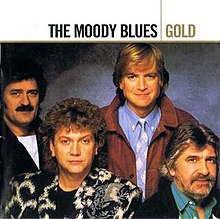
The Moody Blues were an English rock band formed in Birmingham in 1964. The band initially consisted of Graeme Edge (drums), Denny Laine (guitar/vocals), Mike Pinder (keyboards/vocals), Ray Thomas (multi-instrumentalist/vocals), and Clint Warwick (bass/vocals). Originally part of the British beat and R&B scene of the early–mid 1960s, the band came to prominence with the UK No. 1 and US Top 10 single "Go Now" in late 1964/early 1965. Laine and Warwick both left the band in 1966, with Edge, Pinder and Thomas recruiting new members Justin Hayward (guitar/vocals) and John Lodge (bass/vocals). They embraced the psychedelic rock movement of the late 1960s, with their second album, 1967's Days of Future Passed, being a fusion of rock with classical music that established the band as pioneers in the development of art rock and progressive rock. It has been described as a "landmark" and "one of the first successful concept albums".
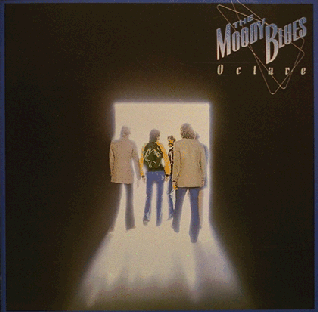
Octave is the ninth album by the Moody Blues, released in 1978, and their first release after a substantial hiatus following the success of the best-selling Seventh Sojourn in 1972. Released after a considerable break, which saw The Moody Blues returning in an era of punk music and disco, Octave produced a reduced commercial outcome for the band, but reached No. 6 in the United Kingdom and went platinum in the United States, where the album reached No. 13. The album produced the hit single "Steppin' in a Slide Zone", which hit No. 39 in the US, in addition to "Driftwood". The album's title is a musical pun: it references both the notion of an octave; and as a word derived from the Latin octavus it refers to this being the eighth album by this line-up of the Moody Blues.
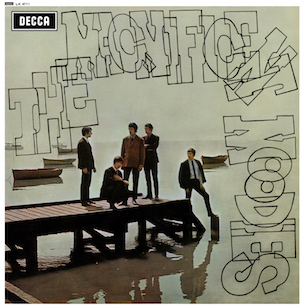
The Magnificent Moodies is the 1965 debut album by British rock band the Moody Blues, released on Decca Records.
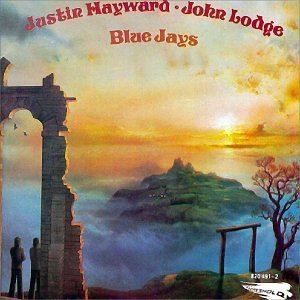
Blue Jays is a 1975 album by Justin Hayward and John Lodge. It was recorded and released during the Moody Blues' five-year hiatus.
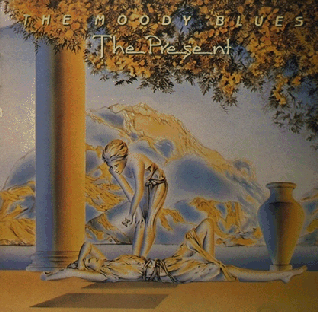
The Present is the eleventh album by the Moody Blues, released in 1983. This was the group's last original studio album to be released on their custom label, Threshold Records.
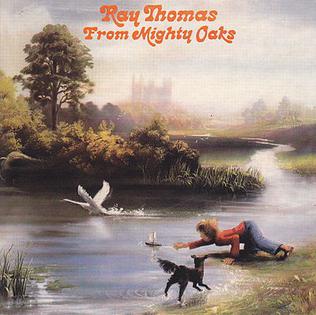
From Mighty Oaks is the first solo album by Moody Blues flautist Ray Thomas together with Nicky James, Trevor Jones, Dave Potts, John Jones and Mike Moran. It was originally released in July 1975 and reissued on Compact Disc in August 1989. Despite the reissue, the album remains quite rare, particularly on CD.

Keys of the Kingdom is the fourteenth album by the rock band the Moody Blues, released in 1991. Although some of the tracks recall the songwriting on Sur la Mer, the failure of Keys of the Kingdom to produce any major hit singles would mark the beginning of the Moodies' decline in popularity with mainstream audiences after their success in the MTV video generation.
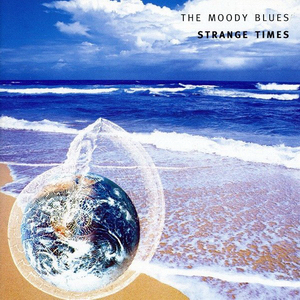
Strange Times is the fifteenth and penultimate studio album by the rock band the Moody Blues, released in 1999. The sound features mostly acoustic guitar, slightly processed electric guitar, light organ, flute, and string arrangements, with heavy synthesizer use in the fast-paced opening track, "English Sunset". This was the last Moody Blues album to feature longtime flautist and vocalist Ray Thomas.

Caught Live + 5 is a live album by The Moody Blues, consisting of a 12 December 1969 live show at the Royal Albert Hall and five previously unreleased studio recordings from 1967 to 1968.

"Voices in the Sky" is a 1968 hit single by the progressive rock band the Moody Blues, written by their lead guitarist Justin Hayward. It was released as a UK single in June 1968, with "Dr. Livingstone, I Presume" on the B-side. It was later released on their 1968 album In Search of the Lost Chord, and was the first of two singles from that album, the other being "Ride My See-Saw".
"Legend of a Mind" is a song by the British progressive rock band the Moody Blues, and was written by the band's flautist Ray Thomas, who provides the lead vocals. "Legend of a Mind" was recorded in January 1968 and was first released on the Moody Blues' album In Search of the Lost Chord. Prominently featuring the Mellotron, it was the first song recorded for the album.

"Never Comes the Day" is a 1969 single by the progressive rock band the Moody Blues. It was written by band member Justin Hayward, and was the only single released from their 1969 album On the Threshold of a Dream.
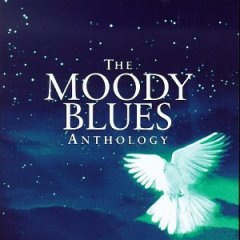
Anthology is a compilation album by the progressive rock band the Moody Blues. It was released in the US on 20 October 1998. It was not released in the UK until 2001 under the title The Collection with different artwork but with the same tracks as the US release.

Greatest Hits is a compilation album by the progressive rock band the Moody Blues, released in 1989. The band recorded new versions of "Isn't Life Strange" and "Question" with orchestration by the London Symphony Orchestra. The arrangements were overseen by Anne Dudley, who also produced the recordings with Justin Hayward and John Lodge. In 1990, only a year after its original release, the album was re-released as Legend of a Band: The Story of the Moody Blues with different artwork to coincide with the release of the home video documentary of the same name.
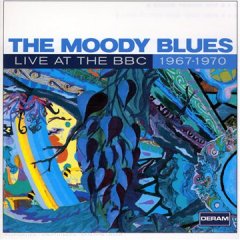
Live at the BBC: 1967–1970 is a two-disc album by The Moody Blues. Released in 2007, it features forty-one live recordings of various performances for the BBC between 1967 and 1970. The album features multiple recordings of some songs, so they are listed more than once. In 2019 the album was reissued on a numbered limited edition triple-coloured vinyl disk set.
"The Best Way to Travel" is a 1968 song by the progressive rock band the Moody Blues. Written by keyboardist Mike Pinder, it was released on the album In Search of the Lost Chord. A wide stereo panning effect, made by the pan pots on the Decca Studios custom-built four-track recording console used during 1967–68, is noticeable on this track.
"Have You Heard" is a 1969 song by the progressive rock band the Moody Blues. Written by the band's keyboardist Mike Pinder, "Have You Heard" is actually a two-part song, and both parts were recorded and released in 1969 on the Moody Blues Album On the Threshold of a Dream.
"Gypsy (Of a Strange and Distant Time)" is a 1969 song by the progressive rock band the Moody Blues, from their album To Our Children's Children's Children, a concept album about space travel. The song was written by band-member Justin Hayward.

Days of Future Passed Live is a live album by The Moody Blues that consists of their live performance at the Sony Centre for the Performing Arts in Toronto in 2017. The album was released on 23 March 2018.
